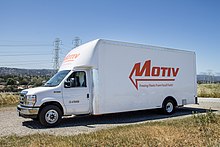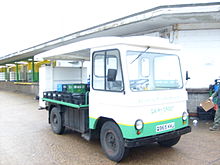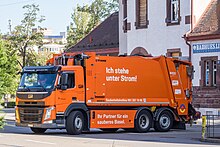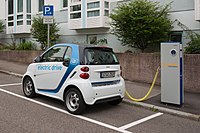Electric truck


An electric truck is a battery electric vehicle (BEV) designed to transport cargo, carry specialized payloads, or perform other utilitarian work.
Electric trucks have serviced niche applications like milk floats, pushback tugs and forklifts for over a hundred years, typically using lead-acid batteries, but the rapid development of lighter and more energy-dense battery chemistries in the twenty-first century has broadened the range of applicability of electric propulsion to trucks in many more roles.
Electric trucks reduce noise and pollution, relative to internal-combustion trucks. Due to the high efficiency and low component-counts of electric power trains, no fuel burning while idle, and silent and efficient acceleration, the costs of owning and operating electric trucks are dramatically lower than their predecessors.[1][2] According to the United States Department of Energy, the average cost per kWh capacity of battery packs for trucks fell from $500 in 2013 to $200 in 2019, and still further to $137 in 2020, with some vehicles under $100 for the first time.[3][4]
Long-distance freight has been the trucking segment least amenable to electrification, since the increased weight of batteries, relative to fuel, detracts from payload capacity, and the alternative, more frequent recharging, detracts from delivery time. By contrast, short-haul urban delivery has been electrified rapidly, since the clean and quiet nature of electric trucks fit well with urban planning and municipal regulation, and the capacities of reasonably sized batteries are well-suited to daily stop-and-go traffic within a metropolitan area.[5][6][7]
In South Korea, electric trucks hold a noticeable share of the new truck market; in 2020, among trucks produced and sold domestically (which are the vast majority of new trucks sold in the country), 7.6% were all-electric vehicles.[8]
History
[edit]Autocar Trucks and several other pioneering American truck manufacturers, such as the Walker Vehicle Company (see Walker Electric Truck), offered a range of electric trucks for sale in the 1920s.[9] While electric trucks were successful for short-range work, especially in cities, the higher energy-density of non-renewable fuels soon led to the decline of electric-powered trucks until battery technology advanced in the 2000s.
Types
[edit]
General trucks
[edit]A few electric general lorries prototypes or produced by small manufacturers, and often converted Diesel units, have been built until the 2000s. Trials with different companies in real-world conditions, for several months or more, have been conducted, for example with Renault, E Force and Emoss heavy-duty lorries in the 2010s. Renault launched its small electric Maxity in 2010 and Mitsubishi Fuso its slightly larger eCanter in 2017. From 2018, other major manufacturers including MAN, Mercedes-Benz and DAF began deliveries of prototypes or pre-production heavy-duty units to companies for real-world testing. In 2019, the first series production of heavy-duty lorries is expected to begin with notably Renault, Volvo and MAN.
The Futuricum Logistics 18E, first delivered in March 2021[10] to DPD in Switzerland, uses a 680-kWh battery and has a range of "up to" 760 km (472 mi).[11]
Delivery trucks
[edit]
Last-mile delivery trucks are a growing segment of truck traffic with the increase in e-commerce and direct-to-consumer sales. Also known as Walk-in-Vans and box trucks, these trucks tend to be used on either fixed routes or with a fixed region for deliveries.[12] Large buyers of these trucks include Amazon, UPS, FedEx, Bimbo, Aramark and others. With use from direct-to-consumer sales to things like linen and bread deliveries or beverage distribution, these trucks are very common. Motiv Power Systems has delivered units used by United States Postal Service and Bimbo Bakeries USA based on Ford chassis. These Motiv options have a variety of body styles from conventional manufacturers including Morgan Olson,[13] Utilimaster,[14] and Rockport.[15]
Lightning EMotors has delivery trucks built on the Izusu platform.[16] BYD Auto has several truck models ranging from class 4 through 8 trucks. GM subsidiary BrightDrop is trying to develop custom solutions for this market. While many large automotive companies have made announcements about their intent to enter this market with showcases of their prototypes,[17] the majority of vehicles on the road today are from smaller manufacturers.
Pickup trucks
[edit]

In the late 1990s and early 2000s, Chevrolet produced a small series of an electric S-10 pickup truck while Ford made a certain number of Ranger EVs.
In early 2009, Phoenix Motorcars introduced a test fleet of their all-electric SUT (Sports Utility Truck) to Maui. Miles Electric Vehicles imported the Chinese-designed ZX40ST electric small pick-up in the United States in the late 2010s.[18]
A Canadian company named Ecotuned offers an all-electric conversion of the Ford F-150; these vehicles are used by the electricity provider Hydro Quebec and Montreal Airport.
As of 2022, Ford is manufacturing the all-electric F-150 Lightning (in a new factory built next to the existing one in Dearborn) while Rivian is making the R1T all-electric pickup truck in Normal, Illinois. General Motors is making the GMC Hummer EV and the Silverado EV.
Models in production include:[19]
- JAC Shuailing i3-T330
- Dongfeng Rich 6 EV
- Dongfeng Rich EV
- JMC Yuhu 7 EV
- Great Wall Wingle 7 EV
- Jiangxi Isuzu Ruimai EV
- Rivian R1T
- Ford F-150 Lightning
- GMC Hummer EV
- Radar RD6
- ACE Yewt
- Tesla Cybertruck
- Chevrolet Silverado EV
- Maxus T90 EV
Announced models include:
- ZERO ZED70[20]
- Fisker Alaska
- GWM Poer EV
- ALPHA SUPERWOLF
- Canoo Pickup
Additionally, many Neighborhood Electric Vehicles are, or were, available as light pickup trucks.
Semi-trailer and tractor trucks
[edit]As of 2020, electric semi-trucks are in limited commercial use in California at Anheuser-Busch, GSC Logistics, Golden State Express (all using the BYD 8TT semi-tractor), Penske, and NFI (both using the Freightliner eCascadia semi-tractor).
These trucks are not limited to operation within seaports or drayage operations; their range (in the case of the BYD 8TT, 124 miles at full load and 167 miles at half load) allows use on regional routes. GSC Logistics demonstrated this by hauling cargo from the Port of Oakland, over the Altamont Pass, to Tracy, CA and back. After returning, the truck still had 40% of its battery remaining.[21]
Volvo, DAF, MAN, Freightliner plan to begin series production of electric articulated lorries between 2019 and 2020.[needs update] Tesla joined in 2022 with the Tesla Semi. Such vehicles are manufactured by BYD Auto (e.g., BYD 8TT).
PACCAR-owned DAF Trucks have opened a dedicated 5,000 m2 electric truck assembly line for their XF and XD range of electric trucks in Eindhoven, the Netherlands with series production from mid-2023.[22]
On 13 May 2021, Autocar Trucks announced the launch of the E-ACTT, a fully electric terminal tractor. 98 years earlier, Autocar was the first major truck manufacturer to introduce electric trucks, in 1923.[23]
The Kenworth T680E also became available in 2021.[24]
History
[edit]The Port of Los Angeles and South Coast Air Quality Management District have demonstrated a short-range heavy-duty all-electric truck capable of hauling a fully loaded 40-foot (12.2 m) cargo container. The current design is capable of pulling a 60,000 lb (27,000 kg) cargo container at speeds up to 10 mph (16 km/h) and has a range of between 30 and 60 miles (48 and 97 km). It uses 2 kilowatt-hours per mile (1.2 kW⋅h/km; 4.5 MJ/km), compared to 5 miles per US gallon (47 L/100 km; 6.0 mpg‑imp) for the hostler semi tractors it replaces.[25]
Economics
[edit]1 U.S. gallon (0.83 imperial gallons; 3.8 liters) of fuel is equivalent to 33.7 kWh, according to the US Department of Energy.[26] This[which?] electric truck uses 2 kilowatt-hours per mile which is the equivalent of using only 10 kWh per every 5 miles (8 km). The diesel truck that it replaces[which?] uses the equivalent of 33.7 kWh per 5 miles (8 km). Thus, the diesel truck is using 3.37 times the amount of energy that the electric truck is using. Therefore, the only variables that are stopping commercial use of electric trucks are original vehicle cost and driving range, owing to the high battery pack cost and low specific energy.[27] As mass production begins, the cost might eventually be comparable to diesel vehicles and with improvement in batteries the limited range of the electric truck might be a non-issue.[original research?]
Cargo vans
[edit]
As of 2022, the following models (among others) are available in Europe:
- Ford E-Transit
- Fiat E-Ducato
- Peugeot e-Boxer/Citroen e-Jumper
- Renault Master E-Tech Electric
- Mercedes eSprinter
- Maxus eDeliver 3
- Maxus eDeliver 9
- Peugeot e-Expert/Citroen e-Jumpy/Opel Vivaro-e/Toyota ProAce Electric/Fiat E-Scudo
Milk float
[edit]
A common example of the battery electric trucks is the milk float. Because such vehicles make many stops, it is more practical to use an electric vehicle than a combustion truck, which would be idling much of the time; it also reduces noise in residential areas. For most of the 20th century, the majority of the world's battery electric road vehicles were British milk floats.[28]
Garbage truck
[edit]

With a similar driving pattern of a delivery vehicle like the milk float, garbage trucks are excellent candidates for electric drive.[citation needed][attribution needed] Most of their time is spent stopping, starting or idling. These activities are where internal combustion engines are their least efficient. These and other factors such as ease of driver training resulted in Birmingham City Council opting to use electric dustcarts to start replacing its horse driven carts in 1918.[29] Its use of electric vehicles continued through a number of models including Electricar DV4s until 1971.[29][30] Electric Dustcarts were also operated by Sheffield and Glasgow.[31]
In preparation for the 2008 Olympic Games, 3,000 of the internal combustion engine garbage trucks in Beijing were replaced with lithium ion polymer battery pack electric drive trucks.[32] The batteries were procured for about $3,300 each.[33] In France, some all-electric garbage trucks produced by Power Vehicle Innovation have been operating since 2011 in the city of Courbevoie, the first local authorities in France to acquire them.[34]
In September 2014, an electric garbage truck, called the ERV (electric refuse vehicle), was deployed in the US city of Chicago. It was the first of an up to $13.4 million purchase order for up to 20 trucks.[35] The PO was won in a competitive bid by Motiv Power Systems in 2012, but only one truck was ever delivered. Chicago sued Motive in 2019, alleging the truck was inoperable more than 60% of the time.[36]
In Europe, as of 2020, electric garbage trucks have been ordered by Geneva,[37] Basel,[38] Frankfurt,[39] Duisburg[40] and other cities.[41] Traditional garbage trucks have extremely high fuel consumption, higher than American 18 wheelers achieve on most routes. Using an electric drive instead of a diesel engine dramatically lowers energy consumption, yet it is still around 1,900 Wh/km or 3,060 Wh/mi. With a 340-kWh battery,[37] such a truck can still achieve a range of over 177 km (110 miles) before it needs recharging.
Off-road and mining truck
[edit]Some attempts to produce such lorries have been made; for example, one by PapaBravo. Electric mining trucks have the benefit of not polluting underground. In case of high-altitude mines, the downhill trip with ore recharges the batteries due to regenerative braking.[42][43]
Solar assist
[edit]Solar panels on tractors typically support the HVAC system, or power devices used by the driver (hotel loads). Solar panels on trailers can be used for refrigeration batteries, for liftgate batteries, or for telematics. Small solar panels mounted on a refrigeration unit can serve as trickle chargers for the refrigeration unit's starting battery.[44][45]
Heemskerk Dairy combines vehicle-integrated photovoltaics with electric forklifts, to ensure quiet operations that keep livestock relaxed.[46]
In 2022, DHL announced that installation of solar panels on the roofs of 67 of its trucks would result in cost savings and a 100 kg/year reduction in carbon emissions per vehicle.[47]
Health benefits
[edit]Replacing heavy-duty diesel vehicles with electric alternatives is beneficial to public health as heavy-duty vehicles are responsible for a disproportionately large share of diesel emissions from the transportation sector.[48] The presence of diesel exhaust in the air increases the risk of asthma, heart attacks and strokes, lung cancer, and early death.[49] New vehicle emission standards are expected to reduce local pollution around 2030 partly by encouraging electric trucks,[50] such as the Advanced Clean Trucks rule in some American states.[51] In Europe rather than Euro 7 a CO2 standard may reduce local pollution.[52]
Makers and models
[edit]Retrofits
[edit]Some companies retrofits combustion trucks to electric, because it can be cheaper than buying a new electric one and brings the benefits of an all electric power train.[53]
Contributions
[edit]California
[edit]
In California, 70% of the smog pollution and 80% of carcinogenic diesel soot comes from the two million trucks out of 30 million registered in that state. As a remedy, California has decided to begin the clean truck standard. California has started its zero emission truck program in which they accelerate the production and deployment of electric trucks.[54] At the end of 2021, California had 738 ZEV trucks, mostly battery powered.[55]
An Electrified Charging Corridor Project, with 5 charging stations for medium and heavy EVs, will be completed by 2023. Chargers are already available at TEC Fontana and TEC La Mirada.[56]
In 2023, the U.S. Environmental Protection Agency gave the legal authority to California to require that half of all heavy-duty truck sales be fully electric by 2035.[57] By 2045, all trucks will have to be zero-emissions.[58]
South Korea
[edit]In South Korea, electric trucks hold a noticeable share of the new truck market; in 2020, among trucks produced and sold domestically (which are the vast majority of new trucks sold in the country), 7.6% were all-electric vehicles.[8]
China
[edit]In China, by the end of 2020, there were around 466,000 New Energy Buses (NEB) in operation, of which 378,700 buses are Battery Electric Buses (BEB), accounting for 66% and 53.8% of the total amount of buses, respectively. It is expected that 72% of China's urban public buses are expected to be electric by 2025.[59]
Vietnam
[edit]In Vietnam, the first 6 electric trucks for waste collection in Vietnam was launched in Hue City through the local People's Committee[60] for a pilot scheme in May 2023. This pilot was supported by the United Nations Development Programme's "Catalyzing a Sustainable Shift Towards E-Mobility in Vietnam",[61] which is supported by the government of Japan, through the Embassy of Japan in Vietnam.[62]
Incentives
[edit]
Launched by the California Air Resources Board in 2009, the California Hybrid and Zero-Emission Truck and Bus Voucher Incentive Project (HVIP for short) is part of California Climate Investments.[63]
See also
[edit]- Battery electric bus
- Battery electric vehicle
- CalCars
- CarGoTram
- Charging station
- E-FORCE ONE
- Electric bus
- Electric van
- Electric vehicle conversion
- Ground support equipment
- Hybrid electric truck
- Modec
- North American Council for Freight Efficiency
- Smith Electric Vehicles
- Solar-charged vehicle
- Trolleytruck
- VIA Motors
- Volta Trucks
- Wrightspeed
References
[edit]- ^ "Calculating the total cost of ownership for electric trucks". Transport Dive. Retrieved 2021-02-27.
- ^ "Electric trucking offers fleets ergonomic efficiency potential | Automotive World". www.automotiveworld.com. 2021-01-11. Retrieved 2021-02-27.
- ^ Adler, Alan (2019-03-08). "2019 Work Truck Show: Adoption of Electrification Won't be Fast". Trucks.com. Retrieved 2019-04-04.
- ^ Edelstein, Stephen (2020-12-17). "EV battery pack prices fell 13% in 2020, some are already below $100/kwh". Green Car Reports. Retrieved 2021-06-13.
Electric-car battery-pack prices have fallen 13% in 2020, in some cases reaching a crucial milestone for affordability, according to an annual report released Wednesday by Bloomberg New Energy Finance. Average prices have dropped from $1,100 per kilowatt-hour to $137 per kwh, decrease of 89% over the past decade, according to the analysis. At this time last year, BNEF reported an average price of $156 per kwh—itself a 13% decrease from 2018. Battery-pack prices of less than $100 per kwh were also reported for the first time, albeit only for electric buses in China, according to BNEF. The $100-per-kwh threshold is often touted by analysts as the point where electric vehicles will achieve true affordability. Batteries also achieved $100 per kwh on a per-cell basis, while packs actually came in at $126 per kwh on a volume-weighted average, BNEF noted.
- ^ Domonoske, Camila (2021-03-17). "From Amazon To FedEx, The Delivery Truck Is Going Electric". National Public Radio. Retrieved 2021-06-13.
All major delivery companies are starting to replace their gas-powered fleets with electric or low-emission vehicles, a switch that companies say will boost their bottom lines, while also fighting climate change and urban pollution. UPS has placed an order for 10,000 electric delivery vehicles. Amazon is buying 100,000 from the start-up Rivian. DHL says zero-emission vehicles make up a fifth of its fleet, with more to come. And FedEx just pledged to replace 100% of its pickup and delivery fleet with battery-powered vehicles.
- ^ Joselow, Maxine (2020-01-11). "Delivery Vehicles Increasingly Choke Cities with Pollution". Scientific American. Retrieved 2021-06-13.
Electric vehicles, delivery drones and rules on when delivery trucks can operate are some solutions proposed in a new report. The report provides 24 recommendations for policymakers and the private sector, including mandating that delivery vehicles are electric. The report notes that if policymakers care about sustainability, they may want to impose aggressive new electric vehicle regulations.
- ^ Gies, Erica (2017-12-18). "Electric Trucks Begin Reporting for Duty, Quietly and Without All the Fumes". Inside Climate News. Retrieved 2021-06-13.
Replacing fleets of medium- and heavy-duty trucks can help cut greenhouse gas emissions and make cities quieter and cleaner. Because trucks need so much hauling power, they have eluded electrification until recently; a battery that could pull significant weight would itself be too hefty and too expensive. But now, improvements in battery technology are paying off, bringing down both size and cost. The number of hybrid-electric and electric trucks is set to grow almost 25 percent annually, from 1 percent of the market in 2017 to 7 percent in 2027, a jump from about 40,000 electric trucks worldwide this year to 371,000.
- ^ a b Hyundai Porter/Porter II Electric: 9037. Kia Bongo EV: 5357. Domestically produced trucks sold in the country: 188222. mk.co.kr autoview.co.kr zdnet.co.kr
- ^ "AutoCar Archives".
- ^ "Designwerk Group". 2021-03-05 – via Facebook.
- ^ "DPD Switzerland gets electric truck with 680-kWh battery". electrive.com. 2020-06-14.
- ^ Crissey, Alex (2021-06-14). "The Role For Electric Vans In Last Mile Delivery". Managing Editor of Fleet Equipment Magazine. US. Retrieved 2022-12-05.
- ^ "StackPath".
- ^ "StackPath".
- ^ "Motiv Power Delivers 9 Box Trucks to Non-Profit".
- ^ "Lightning ZEV6 class 6 electric truck".
- ^ "We drove all of Daimler's electric trucks and want to see them everywhere". 2021-05-25.
- ^ David Levine (2009-06-17). "Creating a Buzz; A Sullivan County firm leads the way by selling alternative-power cars and trucks". Hudson Valley. Retrieved 2012-03-11.
- ^ "锐骐6电动上市 国内还有哪些电动皮卡可选-皮卡行情导购-皮卡资讯-中国皮卡网". www.cnpickups.com.
- ^ "Australia's first fully electric ute is built right here in Adelaide (2mins) - YouTube". www.youtube.com. Retrieved 2020-11-18.
- ^ "BYD Electric Semi Hauls the First Commercial Cargo Over the Diablo Mountain Range". GSC Logistics. 2019-10-29.
- ^ "New DAF Electric Truck Assembly Plant Opened". Truckpages. UK. 2023-05-02. Retrieved 2023-06-08.
- ^ "Autocar, LLC Launches the E-ACTT, an Emissions-Free, All-Electric Terminal Tractor". currently.att.yahoo.com.
- ^ "Kenworth T680E eligible for $120,000 CARB HVIP voucher incentive in California". FleetOwner. US. 2021-03-03. Retrieved 2023-08-06.
- ^ Theresa Adams Lopez (2008). "Electric Truck Demonstration Project Fact Sheet" (PDF). Port of Los Angeles. Archived from the original (PDF) on 2009-03-20. Retrieved 2009-01-04.
- ^ "My Plug-in Hybrid Calculator".
- ^ Sripad, Shashank; Viswanathan, Venkatasubramanian (2017). "Performance Metrics Required of Next-Generation Batteries to Make a Practical Electric Semi Truck". ACS Energy Letters. 2 (7): 1669–1673. doi:10.1021/acsenergylett.7b00432.
- ^ "Escaping Lock-in: the Case of the Electric Vehicle". Cgl.uwaterloo.ca. Archived from the original on 2015-09-23. Retrieved 2010-11-27.
- ^ a b De Boer, Roger F (1990). Birmingham's Electric Dustcarts. Birmingham & Midland Motor Omnibus Trust. pp. 8–10. ISBN 978-0905586076.
- ^ De Boer, Roger F (1990). Birmingham's Electric Dustcarts. Birmingham & Midland Motor Omnibus Trust. p. 21. ISBN 978-0905586076.
- ^ De Boer, Roger F (1990). Birmingham's Electric Dustcarts. Birmingham & Midland Motor Omnibus Trust. p. 25. ISBN 978-0905586076.
- ^ "Electric Drive Garbage Trucks in Beijing". Jcwinnie.biz. Archived from the original on 2010-10-17. Retrieved 2010-11-27.
- ^ "Advanced Battery Technologies, Inc. Signs Contract to Supply PLI Battery Cells for Electric Sanitation Trucks for 2008 Olympics". Marketwire.com. Retrieved 2010-11-27.
- ^ Sage, Alexandria (2011-05-05). "All-electric garbage trucks to sweep French streets". Reuters.
- ^ "Chicago Picks Motiv for Electric Garbage Trucks". www.greentechmedia.com. Retrieved 2021-03-19.
- ^ Bilyk, Jonathan. "Chicago sues electric truck maker Motiv, says $1.3M electric garbage truck has been a lemon". Cook County Record.
- ^ a b Bosshard, Miriam (2020-09-04). "Elektrisches Müllfahrzeug für Genfs Strassen | Futuricum". www.designwerk.com.
- ^ "Futuricum bringt elektrische Müllfahrzeuge in Basel auf die Straße". 2020-01-28.
- ^ "Frankfurter Müllabfuhr mit Collect 26 E aus der Schweiz rein elektrisch unterwegs". 2019-02-05.
- ^ ONLINE, RP (2020-09-25). "Elektromobilität in Duisburg: In der Stadt ist jetzt der erste E-Müllwagen unterwegs". RP ONLINE.
- ^ "Ein elektrischer Müllwagen für die Strassen Winterthurs". www.toponline.ch.
- ^ "See 40-Ton Electric Mining Truck In Motion". Inside EVs. 2018-04-18.
- ^ "eMining's eDumper is the world's largest electric truck". electrive.com. 2018-04-23.
- ^ Brentano, Barbara. "Solar Panels for Trucks and Trailers, the Time has Come". ACT News. Retrieved 2022-07-24.
- ^ Lockridge, Deborah (2017-09-20). "How Fleets are Using Solar Power". www.truckinginfo.com. Retrieved 2022-07-24.
- ^ "Heemskerk Dairy keeping it calm with SolarOnTop and MOFFETT". IM Efficiency. Retrieved 2022-07-24.
- ^ "DHL installing TRAILAR solar technology on 67 trucks in US". Green Car Congress. 2022-02-28. Retrieved 2022-07-24.
- ^ "Electrifying Heavy-Duty Vehicles Will Benefit the U.S. Economy, Environment, and Public Health - Electrifying Heavy-Duty Vehicles Will Benefit the U.S. Economy, Environment, and Public Health - United States Joint Economic Committee". www.jec.senate.gov. Retrieved 2024-09-29.
- ^ "Fact Sheet | The Future of the Trucking Industry: Electric Semi-Trucks (2023) | White Papers | EESI". www.eesi.org. Retrieved 2024-09-29.
- ^ "New Truck Standards Will Cut Pollution and Costs | ACEEE". www.aceee.org. Retrieved 2024-09-29.
- ^ "Status of vehicle standards in Europe and North America" (PDF).
- ^ "EU reaches deal on near phase-out of diesel trucks". Transport & Environment. 2024-09-02. Retrieved 2024-09-29.
- ^ "Retrofit diesel truck to electric truck - pepper". pepper motion. Retrieved 2022-11-02.
- ^ Lambert, Fred (2020-06-26). "Electric trucks get real boost from California with new zero-emission truck program". Electrek. Retrieved 2020-06-26.
- ^ "White House accelerates plans for zero-emission trucks". Utility Dive.
- ^ "Volvo Trucks constructing electrified charging corridor in California for medium- and heavy-duty EVs". Green Car Congress. 2022-07-15. Retrieved 2022-07-24.
- ^ Newburger, Emma (2023-03-31). "California to require half of all heavy trucks sales to be electric by 2035". CNBC. Archived from the original on 2024-02-24. Retrieved 2024-02-24.
- ^ Ohnsman, Alan. "California To Only Allow Zero-Emission Trucks In The State By 2045". Forbes. Archived from the original on 2024-02-24. Retrieved 2024-02-24.
- ^ Yiyang, Chenzi; Fremery, Vincent (2022-01-29). "E-Bus Development in China: From Fleet Electrification to Refined Management". Transition China. Germany. Retrieved 2022-11-10.
- ^ "UNDP pilots electric trucks for waste collection in central Vietnam". Tuoi Tre News. Retrieved 2024-09-29.
- ^ [1]
- ^ "Piloting Electric Trucks for Waste Collection in Hue City". United Nations Development Programme. Retrieved 2024-09-29.
- ^ "About Us". Hybrid and Zero-Emission Truck and Bus Voucher Incentive Project | California HVIP. Retrieved 2022-11-02.
External links
[edit]- Transport & Environment (2021). How to decarbonise long-haul trucking. An analysis of available vehicle technologies and their associated costs.
- Furrer + Frey (Opbrid) Proposes Tractor Swapping – Pony Express
- Rocky Mountain Institute announces North American Council for Freight Efficiency to help reinvent trucking and carry just as much freight on half the energy
- $600 Electric Truck Conversion
- The next five years the Electric Trucks market will register a 54.0% CAGR in terms of revenue, the global market size will reach US$ 7870 million by 2024, from US$ 590 million in 2019.




